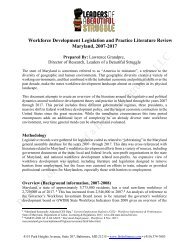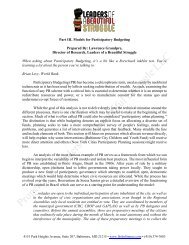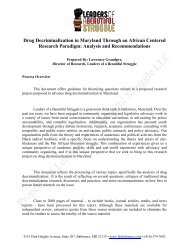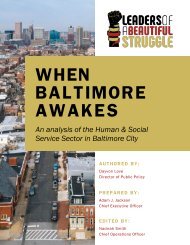The Communal Impacts of Drug Criminalization in Maryland
This project attempts to reframe the harms of drug criminalization. Influenced by African-Centered Research Methodologies, we engaged in a literature review and qualitative research of the communal impacts of drug decriminalization in Maryland, with a specific focus on Baltimore.
This project attempts to reframe the harms of drug criminalization. Influenced by African-Centered Research Methodologies, we engaged in a literature review and qualitative research of the communal impacts of drug decriminalization in Maryland, with a specific focus on Baltimore.
Create successful ePaper yourself
Turn your PDF publications into a flip-book with our unique Google optimized e-Paper software.
Policymakers and researchers <strong>in</strong>terested <strong>in</strong> productive and emancipatory research must challenge the<br />
simplistic notion that Portugal represents a “best practice” <strong>in</strong> drug decrim<strong>in</strong>alization. <strong>The</strong>re must be<br />
<strong>in</strong>terrogation <strong>of</strong> the social construction <strong>of</strong> knowledge that does not only disrupt prevail<strong>in</strong>g notions <strong>of</strong><br />
decrim but is also void <strong>of</strong> research-related biases. For example, there needs to be more awareness to<br />
challenge police authority with<strong>in</strong> drug policy implementation <strong>of</strong> social control. In Baltimore, analysis <strong>of</strong><br />
drug decrim<strong>in</strong>alization should <strong>in</strong>clude analysis <strong>of</strong> civilian oversight <strong>in</strong>stitutions, <strong>in</strong>clud<strong>in</strong>g the limitations<br />
<strong>of</strong> their oversight capacities because <strong>of</strong> legal obstacles such as the <strong>Maryland</strong> Law Enforcement Officer’s<br />
Bill <strong>of</strong> Rights.<br />
In conclusion:<br />
Interviewee recommendations made it clear that we must <strong>in</strong>corporate community perspectives <strong>in</strong>to drug<br />
policy solutions. Interviewees also emphasized the need to <strong>in</strong>vest <strong>in</strong> Black Civil Society <strong>in</strong>stitutions that<br />
have been deeply disrupted by drug crim<strong>in</strong>alization. <strong>The</strong>se are complex issues, and the solutions are<br />
complex. We learned that a few edits to the system are unlikely to produce the <strong>in</strong>tended impacts <strong>of</strong> a sole<br />
public health approach. Decrim policy must be grounded <strong>in</strong> promot<strong>in</strong>g the peace that was undone largely<br />
by the War on <strong>Drug</strong>s. <strong>The</strong> work toward reparations that repairs the harm should be rooted <strong>in</strong> community,<br />
led by the community, and for the community.<br />
Recommendations for Policy Advocates<br />
<strong>The</strong> co-author, Lawrence Grandpre, born and raised <strong>in</strong> <strong>Maryland</strong>, has worked extensively over the past 8<br />
years <strong>in</strong> the state capital <strong>of</strong> Annapolis on a variety <strong>of</strong> legislative issues rang<strong>in</strong>g from bail reform, police<br />
accountability to cannabis reform. This report set out to create resources to help advocates push for drug<br />
decrim<strong>in</strong>alization. Based upon the f<strong>in</strong>d<strong>in</strong>gs <strong>of</strong> this report, and the co-author’s experience with legislative<br />
advocacy, a list <strong>of</strong> recommendations has been created to provide concrete takeaways for those seek<strong>in</strong>g to<br />
advocate for policy change <strong>in</strong> the state <strong>of</strong> <strong>Maryland</strong>.<br />
<strong>The</strong>se recommendations are presented with the <strong>in</strong>tent <strong>of</strong> start<strong>in</strong>g a conversation around bridg<strong>in</strong>g the<br />
space between the sorts <strong>of</strong> people participat<strong>in</strong>g <strong>in</strong> this study, represent<strong>in</strong>g Black civil society members<br />
who have worked to restore the civic capacity <strong>of</strong> the Black community to operationalize self-governance,<br />
and with <strong>in</strong>stitutions and communities work<strong>in</strong>g on drug policy who <strong>of</strong>ten do not engage these perspectives<br />
and understand the concerns these communities have. <strong>The</strong> goal is for reth<strong>in</strong>k<strong>in</strong>g and reconceptualiz<strong>in</strong>g<br />
the work.<br />
A full <strong>in</strong>terrogation <strong>of</strong> the f<strong>in</strong>d<strong>in</strong>gs <strong>of</strong> this document is beyond the scope <strong>of</strong> this paper, but this paper felt<br />
<strong>in</strong>complete without <strong>in</strong>clusion <strong>of</strong> these 4 central observations.<br />
1. To Overcome “Crim<strong>in</strong>al Justice Reform Fatigue,” Focus on Community Investment<br />
In our work push<strong>in</strong>g cannabis reform <strong>in</strong> <strong>Maryland</strong>, we at Leaders <strong>of</strong> a Beautiful Struggle have been<br />
surprised that some <strong>of</strong> the lawmakers who <strong>in</strong> the past had expressed support for drug policy reform<br />
seemed unenthusiastic around cannabis legalization. Some discussed pass crim<strong>in</strong>al justice reform efforts<br />
fail<strong>in</strong>g to provide them with the resources they need to fundamentally change conditions <strong>in</strong> their districts.<br />
Recall<strong>in</strong>g that the “progressive” nature <strong>of</strong> these bills are used to justify not do<strong>in</strong>g redistributive policy by<br />
those <strong>in</strong> Democratic Party leadership, essentially allow<strong>in</strong>g them to say, “we already did our social justice<br />
th<strong>in</strong>g.” If social justice policy is treated as a box to check <strong>of</strong>f, then some lawmakers have stated they would<br />
rather save their political capital for policy which they felt has more transformative impact on their<br />
communities, like community economic development policy.<br />
This dynamic, which I have dubbed “crim<strong>in</strong>al justice reform fatigue,” is echoed by <strong>in</strong>terviewees <strong>in</strong> this<br />
report. Folks expressed frustration <strong>in</strong> superficial and failed reforms that claimed community <strong>in</strong>vestments<br />
which don’t materialize or benefit them. An example <strong>of</strong> this is the <strong>Maryland</strong> Justice Re<strong>in</strong>vestment Act<br />
(JRI), which despite claims to use the sav<strong>in</strong>gs from limit<strong>in</strong>g <strong>in</strong>carceration <strong>of</strong> “non-violent drug <strong>of</strong>fenders”<br />
to <strong>in</strong>vest <strong>in</strong> communities, failed to produce <strong>in</strong>vestment <strong>in</strong> community-based alternatives to <strong>in</strong>carceration,<br />
with an analysis <strong>of</strong> JRI’s re<strong>in</strong>vestment efforts not<strong>in</strong>g technical assistant providers feedback:<br />
42 <strong>of</strong> 55









